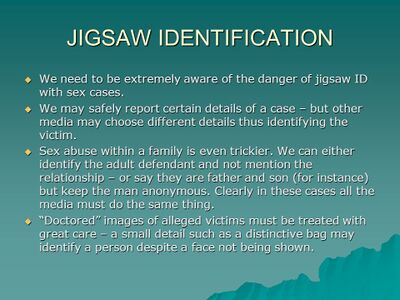Jigsaw Identification
 | |
Jigsaw Identification is the ability to identify someone by using two or more different pieces of information from two or more sources – especially when the person's identity is meant to be secret for legal reasons. A law or the ruling of a particular judge can ask that someone involved in a crime is not named. It maybe because of the sort of crime it was or if they're young.[1]
Journalists and editors are unlikely to print someone's name, but they have to be careful about what they do say. They might give out little bits of information which when pieced together allow someone to be identified.[2]
Jigsaw ID has appeared recently, and been used most commonly in the sad cases of people involved in court cases who had had their identity protected being identified by different papers revealing key parts of information. Hence, the definition sets out that the information comes from two or more sources – as the cases involved usually involved two or more newspaper sources. Yet, the definition is applicable to medical cases and the use of social media.[3]
Anonymity
Any victim of any sex offence – man or woman, adult or child – has guaranteed anonymity for life. This begins as soon as the allegation is made – whether or not the police are informed, the allegation is withdrawn, there’s a prosecution, a conviction or an acquittal. It covers a very wide range of offences from exposure, voyeurism and grooming through to rape. It also applies to conspiracy and incitement to commit any of these offences. It applies to civil and criminal courts and some employment tribunals.
Anonymity does not apply if the victim is dead – rape and murder, for instance. Or if the alleged victim is prosecuted for wasting police time or perjury. An adult victim can waive their own right to anonymity – but it should be in writing. A child cannot waive nor can anybody else on their behalf. Anonymity means we cannot give a person’s name, address, school, workplace or picture. All sex offences are “either-way” except rape, assault by penetration and sexual activity with a child under 13 which involves penetration. These are indictable-only.[4]
Sex cases
We need to be extremely aware of the danger of jigsaw ID with sex cases. Certain details of a case may be safely reported – but other media may choose different details thus identifying the victim. Sex abuse within a family is even trickier. We can either identify the adult defendant and not mention the relationship – or say they are father and son (for instance) but keep the man anonymous. Clearly in these cases all the media must do the same thing. “Doctored” images of alleged victims must be treated with great care – a small detail such as a distinctive bag may identify a person despite a face not being shown.[5]
Ethical considerations
Both the Press Complaints Commission Code and the Ofcom Broadcasting Code emphasise an ethical dimension to sex offences as well as a legal one. Clause 11 of the PCC code says we must not publish anything which might lead to ID unless there is adequate justification and we are legally free to do so. Clause 7 says we must not, even if legally free to do so, ID children under 16 who are victims or witnesses in a case involving sex offences. The PCC says adult defendants may be identified but the word incest must not be used as this would lead to the ID of the child. Nothing must imply a relationship between the two.[6]
Related Documents
| Title | Type | Publication date | Author(s) | Description |
|---|---|---|---|---|
| Document:Craig Murray - Political Prisoner of the British State | Speech | 30 July 2021 | Craig Murray | "This is selective prosecution. This is political persecution. And I have no doubt whatsoever that I go to jail as a political prisoner" (extract from Craig Murray's speech two days before going to Edinburgh's Saughton Jail). |
| Document:Craig Murray’s jailing is the latest move in a battle to snuff out independent journalism | blog post | 30 July 2021 | Jonathan Cook | Assange and Murray are not only telling us troubling truths we are not supposed to hear. The fact that they are being denied solidarity by those who are their colleagues, those who may be next in the firing line, tells us everything we need to know about the so-called mainstream media: that the role of corporate journalists is to serve establishment interests, not challenge them. |
| Document:Lady Dorrian's Law | blog post | 30 July 2021 | Stuart Campbell | The ruinous determination of the Scottish Government and the Scottish judicial system to put someone, anyone connected to Alex Salmond in jail out of the First Minister’s demented paranoia and sheer malice has had many disastrous outcomes, for individuals, taxpayers and the country as a whole. |
References
- ↑ "Jigsaw identification: definition"
- ↑ "Media and the law - jigsaw identification"
- ↑ "Jigsaw identification - don’t be puzzled"
- ↑ "Don't let jigsaw identification be a puzzle"
- ↑ "Editors warned over ‘jigsaw identification’ in sex cases"
- ↑ "Any victim of any sex offence – man or woman, adult or child – has guaranteed anonymity for life"